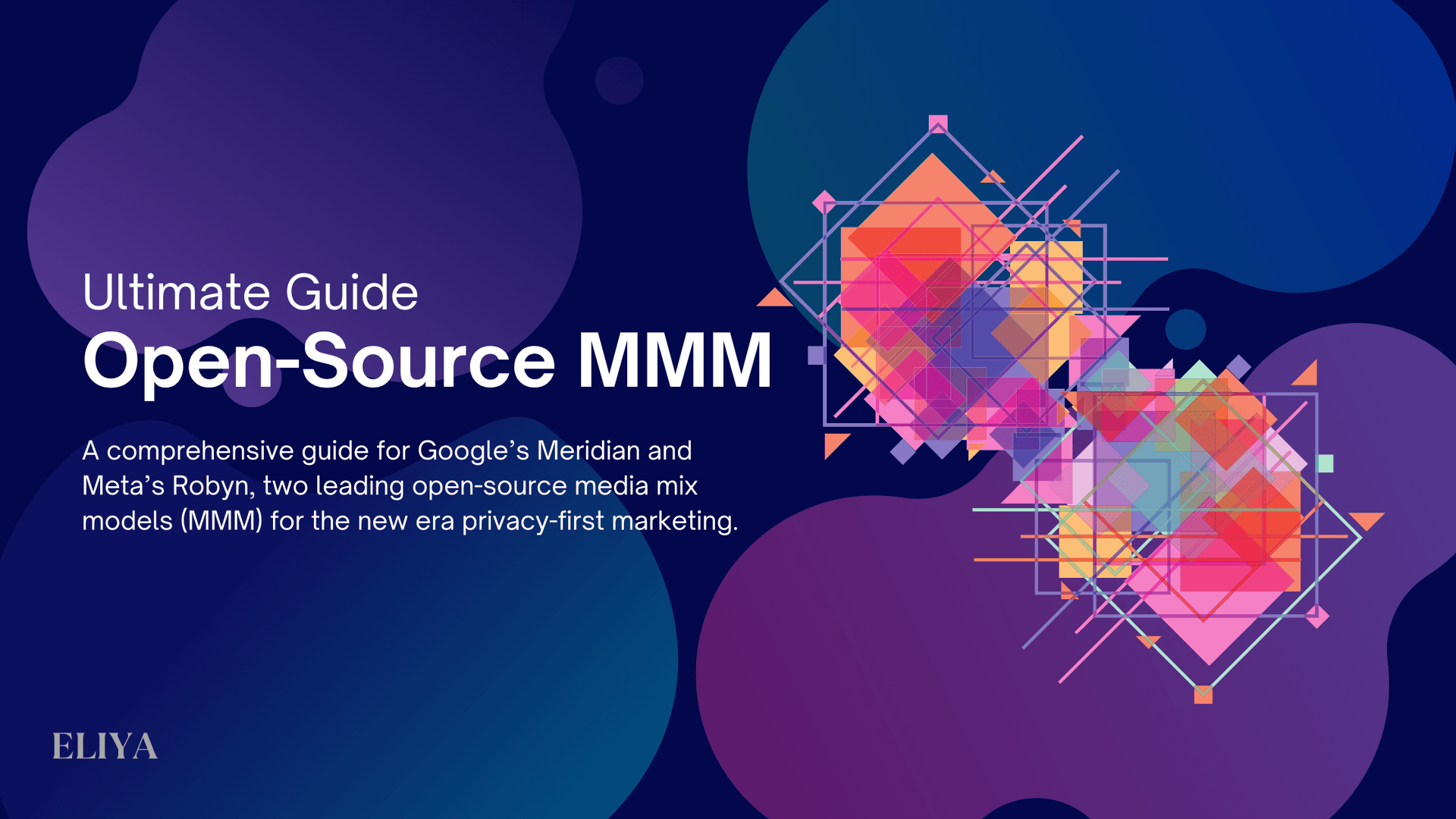Introduction
Marketing Mix Modeling (MMM) is a powerhouse approach for businesses seeking to optimize their marketing strategies and enhance ROI. Integrating MMM within an enterprise is a multifaceted process, demanding meticulous planning, execution, and follow-through. For business leaders, marketing managers, and data analysts looking to implement MMM successfully, these ten key insights serve as a compass to guide your organization through uncharted waters to the shores of success.
Contrary to common misconceptions, the primary aim of MMM is not to achieve pin-point prediction accuracy but to harness business data effectively for intelligent data-driven decisions. It entails a continuous process of analysis, where the insights derived from MMM guide strategic adjustments in marketing approaches.
By focusing on the iterative refinement of strategies based on actual performance data, companies can better allocate their resources, refine their marketing mix, and ultimately enhance their return on investment. This adaptive approach ensures that MMM serves not just as a one-time analytical exercise but as an integral part of a dynamic marketing optimization process.
This article presents 10 essential insights for effectively implementing an MMM approach within an enterprise setting. Drawing from our experience of hands-on MMM implementation at several large companies over the past five years, these insights encapsulate the valuable lessons learned. During this period, I observed firsthand the profound impact that MMM can exert on a company's marketing strategies and financial performance.
1. Tailor Your Strategy
An off-the-shelf MMM solution is unlikely to fit your enterprise's unique needs like a glove. Begin by thoroughly understanding your business's complexities and crafting a strategy aligning with your goals and internal processes. This bespoke game plan will outline your path toward effectively applying MMM.
2. Invest in Talents

The success of MMM implementation heavily relies on the constellation of talents you assemble. This human foundation will become the driving force behind your MMM's success. At the heart of this team should be:
- Data Scientists: They dive deep into your data, applying statistical models to unearth insights that drive strategic decision-making.
- Data Engineers: Their role is crucial in creating the infrastructure needed for data collection, storage, and analysis, ensuring data quality and accessibility.
- Market Analysts: With a keen understanding of the market dynamics, they interpret data outputs from MMM, translating them into actionable strategies.
- Brand Managers: They leverage MMM insights to fine-tune brand strategies, ensuring alignment with broader marketing goals.
- Campaign Managers: These individuals are responsible for implementing the strategies laid out by brand managers, ensuring effective execution across channels.
- Top Executives: Finally, the success of MMM demands endorsement and sponsorship from top-level management, validating and driving the initiative across the enterprise.
This diverse blend of expertise ensures a holistic approach to MMM, leveraging cross-functional insights to drive your marketing efforts forward.
3. Stakeholder Alignment
The full backing of your stakeholders—some of whom may be MMM skeptics—is indispensable. Engage them by clearly articulating MMM's potential enhancements and how they shape the organization's future.
When implementing an enterprise MMM solution, it can be tempting to focus solely on the data science aspect. However, it is crucial to ensure that all relevant business stakeholders and decision-makers are involved in the process. After all, a data-driven solution, no matter how sophisticated, is only effective if it is actually utilized by those who need it.
4. Invest in Right Technology
Selecting the appropriate technology stack for your MMM is critical. The principle of "less is more" should guide your choices here. Focus on investing in essential technologies that not only meet the current needs of your MMM project but also possess the flexibility to scale as your business grows.
This strategy minimizes the complexity and overhead associated with technology maintenance, allowing your team to concentrate on generating insights rather than managing tools. Opt for solutions that integrate seamlessly with your existing infrastructure and can be easily adopted by your team, thus enhancing efficiency and productivity in your MMM initiatives.
5. Set Clear, Actionable KPIs
Set clear key performance indicators (KPIs) and objectives beforehand to measure the efficacy of your MMM. The selected KPIs should represent the strategic goals at every level of your enterprise MMM solution. While Net Booking and Revenue are concerned at the top level, user engagement, such as MAU, is more interesting at the lower level and execution stage.
6. Prioritize Data Integrity
A successful MMM implementation can improve data integrity and consistency across the organization. Enact stringent governance frameworks that assure the accuracy and security of your data. The quality of your insights directly correlates with the quality of your data.
It’s often the case within organizations that important KPIs vary across different departments, with each one using slightly different versions of the same metric. This inconsistency can lead to confusion and misalignment when attempting to assess the company's overall performance or to make cross-departmental strategic decisions.
Implementing a data metalayer can be an effective solution to this challenge. It acts as a unifying layer over your data sources to ensure consistency and accuracy of KPI definitions across the enterprise.
7. Adapt Continuously
Success in MMM isn't set in stone; it requires ongoing vigilance. Learning by doing and improving underlying processes. Remember to take all the stakeholders along throughout this iterative process. Regularly review and recalibrate your MMM strategy to reflect the internal performance metrics and the evolving external market forces.
By staying attuned to these shifts and being prepared to adjust your MMM approach accordingly, you ensure that your marketing strategy remains relevant and effective. This requires a commitment to continuous learning and flexibility in your strategy execution, ensuring that your MMM is always aligned with the most current business objectives and market conditions.
8. Cultivate a Forging Culture
To stay ahead of the game in today's rapidly evolving business landscape, it is imperative to create a culture that not only promotes but champions continuous learning and innovation.
This is the key to ensuring your company remains at the forefront of the industry, driving progress and unlocking new opportunities for growth and success. So, make sure to prioritize a mindset of constant improvement and keep pushing the boundaries of what's possible.InsertRetryShorten it
9. Measure and Showcase ROI
Quantify MMM's impact on your organization's growth and profitability to underscore its value—this reinforces faith in MMM and illustrates its tangible benefits.
By showcasing a solid ROI, you can secure support for future MMM initiatives and ensure continued success. So, remember to measure the impact of your MMM efforts and use those insights to promote their value within your organization.
In the initial years, it is important to measure the frequency of use of the MMM throughout the organization. A great MMM solution is one that is frequently utilized. Therefore, it is essential to assess whether the business stakeholders are using the MMM tool. If they are not, identify the reasons that prevent them from using it.
10. Manage Expectations Realistically - Last but not least!
Expectation management plays a crucial role in the successful implementation of MMM. It's essential to understand that the goal of MMM isn't about predicting the future with absolute precision but about leveraging data to make informed, collaborative decisions that drive the organization toward a common objective.
Cultivating a culture where the team values data-driven insights, yet remains agile and ready to adapt, ensures that MMM's role is seen in the correct light. It's about making smarter decisions as a team that align with the company's overall strategy and goals.
Final Word

Effective data utilization isn't just about technology; it's about people, too. MMM serves as a framework tailored for individuals harnessing data efficiently. Hence, a successful MMM solution must prioritize human-centric approaches.
An excellent enterprise MMM requires a custom approach tailored to your enterprise's unique needs, processes, challenges, and company's customer needs. From assembling a skilled team and ensuring stakeholder alignment to cultivating a culture of continuous improvement, every step is critical.
The insights shared here, derived from extensive experience with MMM, highlight the process's continuous, iterative nature and dependence on data integrity, strategic alignment, and realistic expectations. By prioritizing these key elements, businesses can unlock MMM's full potential, achieving not just a one-time boost but a sustained enhancement of marketing effectiveness and organizational growth.











